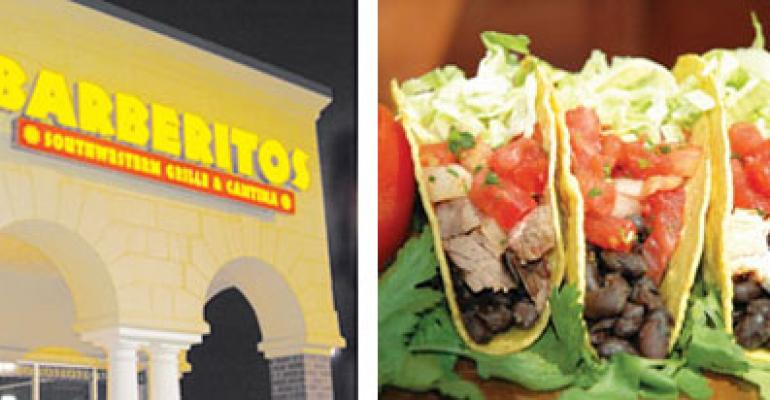Despite continuing economic weakness, Downing Barber says it’s time to resume growing Barberitos, the fast-casual, fresh-Mex concept he founded 10 years ago.
The 22-unit chain, which Barber launched in Athens, Ga., in January 2000, specializes in cooked-to-order Mexican food. The newest unit opened in Roswell, Ga., in December 2009, and Barber anticipates opening more company locations this year. Only two units are currently corporately owned.
Barberitos’ food appeals to a variety of customers, including meat lovers and vegans, calorie counters, and fans of hearty Mexican fare. Menu items include a variety of salads, burritos, fajitas, tacos and quesadillas. The average check is about $7.
Although two units are licensed to sell alcoholic beverages, alcohol sales are not the chain’s primary objective, he said. The concept is geared toward family diners.
Barber discovered his passion for Mexican food while living in Colorado and decided to take the cuisine to Georgia.
“At the time, there wasn’t great demand for the burrito business on the East Coast, especially in Georgia,” he said. “This type of restaurant, with its healthy food, really attracted me.”
Ten years and 22 stores later, Barberitos has weathered many storms—including the current recession and, more recently, the tomato freeze in Florida that wiped out the region’s harvest and caused tomato prices to more than quadruple.
“It’s been tough,” Barber said. “But we’re surviving. We tried to buy as many [tomatoes] as we could from the last truck out of Florida. But right now we’re taking it on the chin waiting for a new harvest to come in.”
Barber said renegotiating his purchasing contracts has put the chain in a stronger place financially.
“We locked in contracts on beef, rice, beans, cheese and sour cream before the crisis happened, so our costs are lower,” he said. “If we keep operating in the same way, we’ll have a very positive future.”
Despite competition from such heavy hitters as Chipotle and Qdoba, the fast-casual Mexican segment is a good place to be, said Ron Paul, president and chief executive of Technomic, a Chicago-based market research firm.
“Americans, not just Latins, like the food and are looking for more options,” he said. “Fresh is definitely seen as healthy. It certainly is looked upon as a trade-up from quick serve, and people are willing to spend considerably more for it.”
Barberitos also faces competition from Moe’s Southwest Grill, a 400-unit chain based in Atlanta and owned by Focus Brands Inc.
Barberitos’ sales currently are flat, but franchisees are increasing their community involvement in a bid to boost sales.
Barberitos HEADQUARTERS: Athens, Ga.MARKET SEGMENT: fast casualMENU: MexicanNO. OF UNITS: 22SYSTEMWIDE SALES: over $10 millionLEADERSHIP: Downing Barber, president and chief executive; Candice Barber, chief financial officer; Macon Evans, director of operations; Elizabeth Dale, head of internal operationsYEAR FOUNDED: 2000TARGET MARKETS: Alabama, Florida, Georgia, Kentucky and MississippiTARGET DEMOGRAPHIC: 16- to 60-year-oldsMETHOD OF GROWTH/FUNDING: franchisingNOTABLE COMPETITORS: Chipotle, Moe’s Southwest Grill, Qdoba
“People are more receptive to those who give back during hard times,” Barber said. “We’re trying to gain the loyalty of our customers by helping out. We’re trying to turn a negative situation into a positive one as best we can.”
As lenders loosen their grip on financing, Barber said he is ready to resume franchising to take advantage of both real estate opportunities and the wealth of people interested in owning businesses.
“We’re looking to grow again,” he said. “We had been, but the tough economic times came and hindered us. Now, though, it seems as if institutions are lending again, but with tougher regulations.”
He added, “There are a lot of people who are out of work and interested in getting into Barberitos to supplement their careers. We’re going to choose from a lot of different people. We prefer to teach them our way anyway so there are no bad habits. We’re basically looking for people who have the capital to open and operate stores.”
Barber said stores cost between $250,000 and $300,000, depending on the build-out. The cost is considerably lower, he added, if the location is in an existing restaurant, which costs between $100,000 and $150,000. Franchise fees and royalty rates are $20,000 and 5 percent, respectively.— [email protected]




